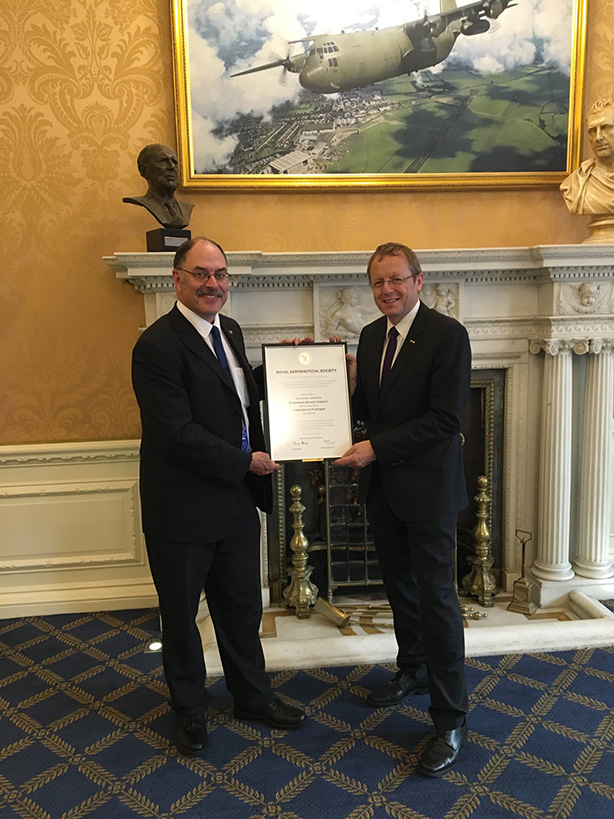= ASTRONAUTICAL EVOLUTION =
Issue 128, 21 July 2016 – 47th Apollo Anniversary Year
| Site home | Chronological index | About AE |
Lecture by Professor Wörner: United Space in Europe
Talk in London
The Director General of the European Space Agency, Professor Johann-Dietrich Wörner, gave an eloquent and uplifting talk at Britain’s Royal Aeronautical Society on 19 July.
But was the inspiration just a little too starry-eyed to make political sense?
Prof. Wörner emphasised our common European heritage:
- Freedom, democracy and human rights.
- Diversity of cultures.
- Philosophy and arts.
- Science and development.
- Pioneering and exploration.
These were all, I would add, greatly accelerated towards their modern forms during the period of European history known as the eighteenth-century Enlightenment (which I deal with in my day job at the Voltaire Foundation, University of Oxford).
Europe’s progress towards a closer European Union enshrining that heritage, and culminating in a United States of Europe (Churchill’s phrase!), has been badly shaken by Brexit. But Prof. Wörner has identified another way to promote our common identity through what he calls United Space in Europe, or alternatively Space 4.0.
He’s written about this in a recent article in The Parliament magazine entitled “Space 4.0 can help EU overcome its challenges”.
Must the return on investment of money spent on spaceflight always be a financial one? he asked in his London lecture. He took the long view: science and exploration were valuable in their own right, and might not achieve practical application for many decades.
For example, what was the practical value of Einstein’s theories of relativity? For decades they could have been regarded as merely an intellectual curiosity. But now they are of direct economic application in navigation satellites, which depend upon keeping time with such precision that relativistic time dilatation due to both their orbital velocity and their location higher up in Earth’s gravitational well must be taken into account.
Prof. Wörner listed the global challenges which ESA is helping to address. To the roster of well-worn themes such as climate change and terrorism, he had added: curiosity. This, too, was a challenge which Europe needed to address if it was to continue making progress and reaffirming its values.
He interpreted the 12 stars on the European flag as representing European values (presumably meaning 12 values, though he did not list them). However, according to the Council of Europe, the 12 stars are “the symbol of completeness and perfection” (Wikipedia). Since neither completeness nor perfection applies very accurately to the Council of Europe, which originated the flag, and even less to the EU as a whole, the flag’s main user, Prof. Wörner’s interpretation makes better sense.
Europe’s space strategy
Space strategy in Europe comes from two sources: the European Commission, implementing the Lisbon Treaty, and ESA itself, advising national space ministers. Prof. Wörner explained how these two institutions were converging on a common space strategy with three fundamental goals:
- Full integration of space into the economy and society.
- A globally competitive European space sector.
- European freedom of action in space, with its own launch vehicles and space infrastructure.
These are high aspirations for a regional power which does not yet have its own independent capability for launching astronauts into orbit. The Prof. did not comment on this disparity between goals and means, but the lack of any manned European launch vehicle (even after the billion or so euros spent on Hermès during the 1980s to 1990s) will seriously cramp Europe’s future options…
Moon Village
Prof. Wörner’s most startling new proposal is Moon Village: his idea for an international lunar base to succeed the International Space Station. He stated at the Royal Aeronautical Society lecture that he would not be asking for any money for Moon Village at the upcoming December ministerial conference in Lucerne. Rather, that meeting will need to focus on agreeing an extension of European commitment to the ISS for the 2020 to 2024 period.
But at the same time he will encourage European space ministers to begin to consider what direction they want European astronaut exploration to take after 2024 and after the ISS programme has been ended. Moon Village is intended to set the terms of that debate. As yet it has no roadmap and no funding. These will come later (it is hoped), once the concept has had a chance to attract general approval and support – an agreed positive vision for future development of the United Space in Europe.
After his talk I asked Prof. Wörner whether ESA had a strategy for reducing the cost of access to space. His reply: ESA has a wish to achieve this, but not a concrete plan. There is a need for new disruptive ideas – and he mentioned Skylon as a possible example of this. But ESA can only do so much to promote Skylon. The main push has to come from the member states – in this case, the UK.
I’ve been critical of the Moon Village concept, but I found a lot to like in this lecture. As well as being supportive of the Skylon project, Prof. Wörner discussed the recent rocket recovery tests done by SpaceX and called for more of the Elon Musk spirit in Europe. He was also keen to promote public-private partnerships, which, he said, could produce a very efficient sharing of both risks and investment.
He did not, however, mention commercial passenger spaceflight, leading on to a space tourism industry, which in my view is the key to affordable and reliable space access (as well as implicit in all three goals of the European space strategy). I would agree with him that the sort of inspiration and motivation in the younger generation that space can produce is well worth having, and represents a valuable “return on investment” even though it cannot be quantified in monetary terms. The problem is that it is also difficult to quantify in terms of political capital.
He did state that every euro spent on space projects had a multiplier effect in the broader economy worth 6 euros (10 euros, if considering specifically Earth observation missions). So presumably there would be no need to quantify the “inspiration” factor.
Yet not everybody is convinced. See for example a recent SpaceNews report by Peter B. de Selding: “But for now, Europe’s lunar exploration plan remains decidedly one of ‘all hat, no cattle,’ as ESA’s national governments remain silent in the face of the enthusiastic backing of ESA Director-General Johann-Dietrich Woerner of an international lunar exploration effort.”
Again, nine years ago an Oxford history professor started a debate about the future of Europe. He did not mention Europe’s role in global exploration, but focused instead on more inward-looking aspects of society. Although I responded to his call for public debate with a letter explaining what he was missing – eloquently, I think – he has not yet replied.
While the public is focused on society’s domestic problems, and while at the same time the cost of each astronaut ticket to the Moon is up in the hundreds of millions of euros, Moon Village will remain an impractical dream, and Europe will continue to be no more than a junior partner in international space projects.
It would be a shame if no way were found out of this cul de sac, for Professor Jan Wörner has an infectious enthusiasm and deserves to see his ideas come to fruition.
Please send in comments by e-mail.
Interesting and relevant comments will be added to this page.
| Site home | Chronological index | About AE |

